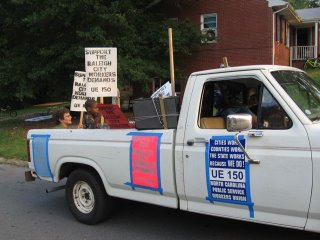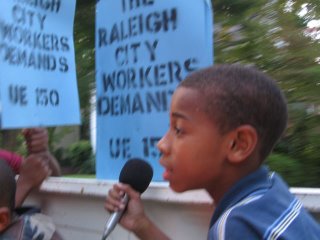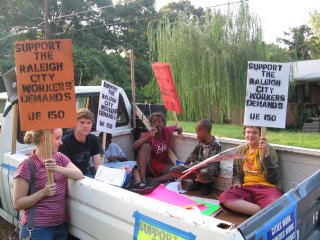


By Leilani Dowell
Beirut, Lebanon
A fact-finding delegation organized by the Campaign for Accountability arrived in war-torn Beirut, Lebanon, on Sept. 11. It consisted of LeiLani Dowell, a managing editor of Workers World newspaper; Sara Flounders, co-director of the International Action Center, and Samia Halaby of the Defend Palestine Committee. They will be visiting the devastated country from Sept. 11-17. Below are excerpts from Dowell’s first report.
Monday, Sept. 11
We arrived in Beirut today after flying into Amman, Jordan, on Sunday. The first signs as we walked into the terminal in Amman were those of greeters waiting to receive people off our flight from DynCorp International and BlackWater USA—the same mercenary corporations that the rich hired in New Orleans to protect their property after Katrina.
[Mercenaries from both BlackWater USA and DynCorp International have been used by the U.S. military all over the globe, including Iraq. Mercenaries from DynCorp International were also alleged to be part of a prostitution ring in Bosnia, yet to this day the company has received over $2 billion in payments from the Department of Defense. When four mercenaries for BlackWater USA were killed in Fallujah, the U.S. occupiers used their deaths as an excuse to unleash a brutal attack on the city. In that and a later invasion, U.S. troops destroyed most of Fallujah, which remains in ruins today. Only half of the original population has returned.—Editor]
Today, we went to the neighborhood of Haret Hreik in South Beirut, a large Shiite community, where Hezbollah has strong support and where the Hezbollah television station Al Manar was housed. Israel razed Al Manar in their first days of bombing, as well as most of the neighborhood of seven- or eight-story apartment buildings, to the ground. Huge craters were all that remain of many buildings—craters created not by the excavation of the debris, but by the magnitude and force of the bombs dropped. The woman we are staying with told us that Israeli planes dropped flyers telling the people to flee their homes before the bombing began. When we asked her whether she had copies of the flyer, she said no. Like many other people, she was too afraid to leave the house because Israel was randomly targeting people on the street. Later, when thousands of bombs rained down, people began fleeing the neighborhood. Today we could see men, women and children returning to the area to sort through the rubble for anything they could find that remained of their homes. The destruction is devastating in a way that I can’t even put into words.
However, the work of cleaning out the debris—a monumental task with all the devastation—has already been undertaken by Hezbollah. The resistance movement has crews in the area, loading debris onto trucks and cleaning out shattered apartments.
We watched several workers carefully removing furniture from an apartment on the fifth floor of a ruined building, as a service to the family that resided there. And with all this work going on, workers today had hosed down a large area and were setting up plastic lawn chairs and speakers for a religious event they were having tonight. We were told that Hezbollah organized it so that the neighborhood could feel like it was getting back to its life.
We passed one of the many highway overpasses that had been bombed during the Israeli assault. While traffic was definitely slower because of the damage, what we noticed was that the area beneath the break had already been cleaned. People were sitting around it, even selling their wares to cars that passed by.
The images of a trip I took to New Orleans after Katrina came to my mind over and over—where, in the same amount of time, nothing had been done to restore the area for the people who lived there; and where, one year later, little to nothing has been done in impoverished areas like the Lower Ninth Ward.
We were able to talk to some of the workers and neighborhood residents. What struck me the most about our conversations is that every single person told us, “The Lebanese people are not against the people of the United States. We know the difference between the people of the U.S. and its government, and it is its terrorist government that we are against.” There is a clear understanding that this most recent attack of Israel on Lebanon was sanctioned and funded by the U.S. Hezbollah has adopted the slogan “The Divine Victory,” and beautiful signs can be seen throughout Beirut with this message in English and Arabic. Some of the billboards are emblazoned with pictures of katusha rockets, some with Sheik Hassan Nasrallah.
Other billboards emphasized the overwhelming civilian toll with pictures of wounded children and the Israeli term that they only struck “extremely accurate targets.”
On top of the ruins of bombed-out apartments and other buildings, signs read “Made in USA” and “The New Middle Beast.”
It appears that the “Divine Victory” slogan serves not only as a reminder of the great triumph that the Lebanese resistance movement has just won, but also as motivation for the ongoing struggle, the struggle against imperialism that the resistance movement here is confident will be won.
Tony Blair was in Beirut today and protests were scheduled. There is a demonstration being called to mark the anniversary of the massacre at the Sabra and Shatila Palestinian refugee camps, in Beirut, on Friday, Sept. 15.
For updates, see eyewitnesslebanon.blogspot.com.












